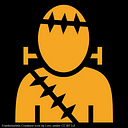In Beetlejuice, two vastly different families are forced together by unexpected circumstances and learn that actions motivated by a ‘desperate times call for desperate measures’ attitude can backfire if you aren’t careful.
Adam and Barbara Maitland are recently deceased and want the Deetzes out of their home. In their desperation, they summon Beetlejuice, an evil spirit, despite being strongly warned not to trust him.
The consequences of unleashing a force of evil come faster than you’d imagine.
Beetlejuice represents the concept of the id — he has no moral compass or impulse control, driven purely by selfishness.
Sigmund Freud’s psychoanalytic theory breaks down the psyche into three parts:
- The ID acts on primal urges, seeking instant gratification without regard for societal norms or ethics.
Imagine seeing someone with a donut and, because you want it, you snatch it right from their hands and eat it right in their face.
- The EGO seeks to satisfy the id’s desires but in socially acceptable ways.

